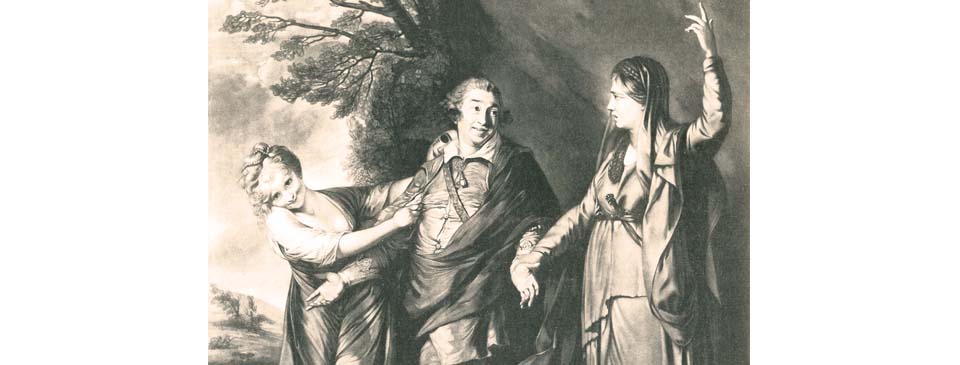David Garrick – master of tragedy and comedy

David Garrick stands between Comedy and Tragedy. The original portrait was painted by Joshua Reynolds in 1760-61 and exhibited at the Society of Artists in 1762, Reynolds’s first to be shown that was not a straight portrait. That same year this mezzotint version was published by Edward Fisher at the Golden Head, Leicester Square. Reynolds has captured Garrick’s ability to switch from tragic and comic roles.
James Lacy died in 1774. Not in the best of health, David decided to retire to have an easier life. “I shall take off my chains,” he wrote to his brother.
Before retiring he set himself the task of having the theatre transformed by the architect Robert Adam, with major changes to the interior and a new entrance. As Garrick said at the time, he found Drury Lane Wren and left it Adam. The work was completed for the 1775 season, following which Garrick sold his share in the theatre to Richard Brinsley Sheridan, son of Garrick’s old acquaintance Thomas Sheridan. By then he had managed Drury Lane for 29 years. When he arrived it had been in a poor state of health but he had transformed it into an artistic and financially successful institution.
Garrick continued to assist Sheridan in revising some of the old Restoration plays so they could be revived at Drury Lane. His retirement from the stage was announced in the press in March 1776. Between then and June he gave a series of performances of many of his greatest roles, with that of Richard III given by royal command. There was a great demand for tickets, with nobility in the audience every evening. Yet despite his great reputation for Shakespearian and other dramatic roles he chose for his final performance that of Don Felix in the comedy The Wonder, following which he gave a speech from the stage.
Garrick’s health was quickly deteriorating and he was laid up on various occasions during 1778. He and Eva-Marie spent that New Year with Earl Spencer at his country home at Althorpe but David was seriously ill and they had to return to the Adelphi where he died four weeks later from failure of the kidneys, shortly before his sixty-second birthday.
Such was Garrick’s fame and reputation that his burial was almost that of a state funeral, which was highly unusual for a commoner. Sheridan made the arrangements. The streets were lined with onlookers as 33 carriages, each pulled by six horses, carried family and friends from the Adelphi to Westminster Abbey. He was the first actor to be buried in Poet’s Corner and the last until Laurence Olivier in the 20th century. His pall-bearers were distinguished men, including Earl Spencer, Viscount Palmerston and the Duke of Devonshire. Horace Walpole commented that the royal court paid more attention to the “internment of a comedian” than to “the great Earl of Chatham”. Those attending included his long-time friends Samuel Johnson, Sir Joshua Reynolds, Edmund Burke and Jean Georges Noverre. A monument was erected to him in Lichfield cathedral with the words from Samuel Johnson: “I am disappointed by that stroke of death that has eclipsed the gaiety of nations, and impoverished the public stock of harmless pleasure.” Eva-Marie outlived David by 43 years.
Garrick was by far the most influential actor of the 18th century, with his reputation having travelled as far as France. His ideas and ability to put them into practice as manager of the Drury Lane theatre left a lasting legacy that ensured London remained as one of the leading theatrical cities, and Shakespeare as the greatest of English playwrights known throughout the world, a situation that has continued into the 21st century. Heart of Oak, with words by Garrick, remains the official march of the Royal Navy. He is still remembered in London by the Garrick theatre which has stood on Charing Cross Road since 1889 and Garrick Street is located close to Covent Garden.
Sources include: Jean Benedetti ‘David Garrick’; Christopher Hibbert ‘The Personal History of Samuel Johnson’; Jenny Uglow ‘Hogarth – A Life & A World’; Ian McIntyre ‘Joshua Reynolds’; Sheila O’Connell ‘London 1753’.
< Back to London People


